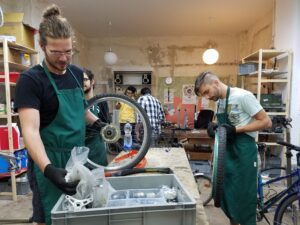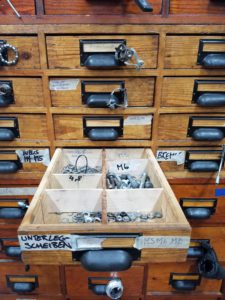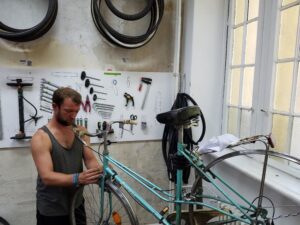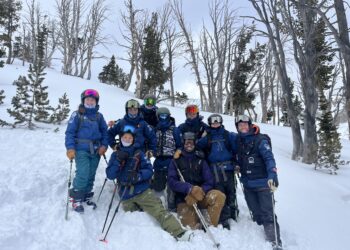Syrian refugees discover bike freedom
Story and photos by Alicia Leggett
Mariya Alesh swung her leg over her new bike for the first time and started pedaling, shaky at first, then more confident. She pulled the brakes, a huge smile spreading across her face.
“I learned to ride a bike as a child, but I’ve never owned one,” she said, excitedly.

Alesh, 20, arrived in Germany from Syria with her new husband in 2015. From a friend, she heard about Rückenwind, an organization in Berlin that collects bikes and bike parts to give to refugees. She signed up for the program and waited two months. This summer, she finally had the chance to build herself a bike and take off.
Rückenwind is just one of many initiatives that sprung up in the German capital in response to the greatest migration of people in Europe since World War II. Its volunteers work with refugees to help them choose and repair bikes. The organization has only one paid employee; everyone else provides their time and services for free.
The project is the brainchild of Lukas Heidenreich, a young Berliner who describes himself as chronically overinvolved. A civil engineering student by day, he is also a booking agent for DJs in Berlin, unless he’s backpacking in Patagonia. He’s the type of person who sees an opportunity and takes action.
“It’s really hard for me to not get carried away,” he said.
Back in the winter of 2014, Heidenreich was one of the first Berliners to notice that the number of people seeking refuge in his city was rising dramatically. Online, he found a list of items that concerned German citizens might be able to provide to the newcomers.
It was drawn up by Moabit Hilft, a local nonprofit that later became instrumental in caring for thousands of people arriving in the German capital in the summer of 2015. The list included items like clothes, shoes, food and bicycles.
For refugees aching to start over in Germany, bikes have the potential to boost mobility—especially for those who take a proactive approach to their future. Rather than having to rely on public transportation, they can cycle to their asylum-related interviews and appointments. They are also more flexible when it comes to attending German classes in places where mass transit is less frequent, especially in the evenings.

Alesh, who lives in a refugee shelter just outside Berlin, takes German lessons at Fachhochschule Potsdam, a college of applied sciences in a smaller city in the state of Brandenburg. Two trams run to the school, but they are often overcrowded, and she finds them nearly inaccessible during rush hour. She’s also wary of unscheduled delays.
“Sometimes you just have to be somewhere on time,” she said.
When Heidenreich saw that refugees needed bikes, he rallied his six best friends and together they started their initiative, which they named after the German term for tailwind. Rather than just handing out old bikes, at Rückenwind volunteers and refugees work together, building partnerships in which people from different cultures can learn about each other.
“It’s something where you can show each other with your hands what to do,” Heidenreich said. “So even if you don’t speak the same language, in the end you share a big success.”
The founders’ idea was popular. They won around $9,000 in a nonprofit contest, allowing them to rent a space for their workshop from the organization Refugio, which houses refugees and runs a café in Berlin. Soon after, Google held a competition for local tech projects with social applications. Rückenwind was a runner-up and received another $11,000. Then, private donations started to arrive and business took off.
In its first year, Rückenwind provided 365 bicycles for refugees. In a country that saw 1.1 million asylum seekers cross its borders in 2015, that may not sound like many bikes. But for a tiny organization that, in its infancy, can only open its doors two days each week, fixing an average of one bike per day for a year was an impressive feat.
Success, however, brought new challenges. Running the organization was expensive, and as full-time students, the project’s founders simply didn’t have the time to serve everyone as quickly as they wanted to, so the waiting list grew. In the summer of 2016, it contained about 400 people, and Heidenreich estimates it will take the organization at least nine months to provide a bike to each person. They have temporarily stopped accepting new applicants.
“If any more refugees come, it would just be—I don’t know—too sad to tell them, yeah, you can come to our shop in one year,” Heidenreich said.
In order to address this challenge, Jakob Schult, a Berliner who met the Rückenwind founders while traveling in Thailand, is developing an app that will record where in Germany there is a need for bicycles, and where bikes are accessible. Since similar initiatives exist all across the country, the app will help direct refugees who need bikes to workshops that have the resources to provide bikes and labor without too long a wait.
“I think it might be a nice way to better settle out the demand and supply,” Schult said, “in order to fix all the bikes as soon as possible for the refugees.”

The app is just one example of how young nonprofits can extend their reach without becoming too big for their own good. Another is to spread and share concepts and knowledge.
Dennis Hoenig-Ohnsorg, who leads the corporate responsibility team for Zalando, a fast-growing e-commerce company based in Berlin, says organizations should seek to replicate the systems they know work.
“You should try to scale your solution, which doesn’t necessarily mean you have to scale the organization,” Hoenig-Ohnsorg said.
Rückenwind is working on a guide to help similar organizations succeed while avoiding some of the trials and errors it experienced. It also hopes the new app will create a network between the groups, which will in turn help them all become more efficient by directing the demand for bikes toward the supply.
Though one is still a volunteer while the other has arrived in the corporate world, Heidenreich and Hoenig-Ohnsorg share characteristics that have shaped a startup culture that separates Berlin from the rest of Germany. They are problem solvers. They also think creatively and constantly look for opportunities.
Mariya Alesh fits right in with this startup generation. She doesn’t wait for life to happen to her. Instead, she takes action.
Last year, in just one week, she decided to marry her then-boyfriend and board a small boat across the Mediterranean to escape the war in Syria and start a new life in Europe.
Today, she can’t wait to become proficient in German, so she can then take academic classes that prepare her for university. For Alesh, the promise of an independent future is embodied in one blue bike.
Alicia Leggett is a reporter for Missoula to Berlin, a project of the UM School of Journalism. Visit missoulatoberlin.atavist.com to hear audio by Autumn Barnes-Fraser accompanying this story, and to read more about the project.













